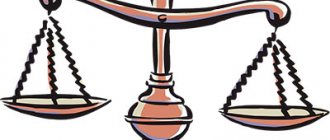What to do if tenants move out without paying?
If the tenants leave the housing, remaining in debt, you need to act in accordance with the following instructions:
- The first step is to contact the debtors and find out the reasons. Sometimes there are situations when after a telephone conversation it is possible to resolve the problem.
- If the conversation does not bring results, the next step can be to attempt pre-trial conflict resolution. To do this, a written claim should be sent to the tenant, indicating the period for repayment of the debt (for utilities, rental housing, etc.).
- If the written request also remains unanswered, then a claim can be filed in court against the unscrupulous tenants.
When such problems arise, one should strive to resolve them peacefully. Only if all attempts at pre-trial settlement of the dispute remain unsuccessful, can you go to court. The fact is that legal proceedings take a lot of time, nerves and money, so such a measure is not always justified (especially if the cost of the claim is insignificant).
Pre-trial settlement of the process
Russian legislation provides for certain cases when pre-trial settlement of a dispute is a prerequisite (for example, in the case of termination of a lease agreement with a tenant against his will). If we are talking about compensation for damage associated with the formation of a debt for utility bills, non-payment of rent, etc., then in this case there is no need for a mandatory pre-trial resolution of the dispute.
Thus,
the apartment owner can immediately file a claim in court. The key factor influencing the success of litigation with unscrupulous tenants, if they rented an apartment and did not pay, is the existence of a lease agreement.
In the absence of this document, the landlord can try to go to court without it, but in this case it will be difficult to prove anything. This circumstance significantly reduces the chances of winning. Important. In order to minimize risks and protect the interests of both parties, the tenant and the landlord are required to enter into a lease agreement with each other when transferring (accepting) housing for temporary use.
In the future, this will allow us to quickly resolve many controversial situations.
Top 10 most common problems with apartment tenants
No one is safe from encounters with negligent tenants. For this reason, you need to be prepared for unforeseen situations and know how to get out of them without financial losses.
They don’t want to move out and pay too
Late payment for accommodation or ignoring it is the most common cause of disputes between the owner of the property and the tenant.
If the rental of living space is not legalized, all that remains is to appeal to the debtor’s conscience and call the police, confirming your rights to the property.
If there are papers signed by both parties, it is worth reminding the tenant of his responsibility before the law. In Art. 682 of the Civil Code states that the tenant is obliged to pay for housing within the terms specified in the contract. In the case of a long-term lease (concluding an agreement for a period of more than a year), it will be possible to evict the tenant through the court only if there is a significant delay in payment. For this reason, it is more profitable to arrange a short-term lease, in which missing two payments is enough to go to court.
A landlord who evicts a tenant before a claim is heard may face trial himself. In this case, you will not have to count on monetary compensation.
What to do if they are not evicted, but there are no delays?
It will not be possible to quickly evict tenants whose agreement is supported by a contract. By law, the owner of the property must warn tenants of the need to vacate the premises 3 months in advance. In this case, you need to indicate a good reason for terminating the agreement, for example, the landlord or his relatives are planning to move into the apartment.
Without a signed agreement, tenants have no legal rights to stay in the premises; you can ask them to move out before making the next payment. If you refuse, contact the police.
Moved out without paying
In this situation, you will be able to receive money only if you have an agreement and a document confirming the fact of payment for accommodation for the previous period. Otherwise, you will not be able to prove that you are right. Using the passport details of the tenants specified in the contract, you need to write a statement to the police regarding fraud (the types and schemes of fraud when renting an apartment are written here).
The agreement can be drawn up in free form. It describes all the important details of the agreement, the obligations and rights of the parties, indicates the amount and time of payment for accommodation, as well as the sanctions that will be applied in case of violation.
Tenant missing
If the tenants have disappeared and have not paid the due amount, and their whereabouts are unknown, you can find the debtors through the court. The application should be submitted at the place of residence of the unscrupulous tenants. In this case, the owner of the property has the right to demand reimbursement of all costs associated with the search for the defendant.
In the absence of an agreement, there is no point in looking for employers; you still won’t be able to get money from them. Some landlords hope to intimidate debtors with a complaint sent to their place of work, but in practice such an action rarely leads to the desired effect.
By renting out housing without a contract, the apartment owner is at great risk. Many tenants know their rights and may ignore the need to pay rent, citing the lack of documents confirming the fact of their residence. At the same time, the landlord cannot go to court because he himself is breaking the law.
Checked out early
Tenants have the right to terminate the contract by notifying the landlord of their intentions three months in advance. If the landlord has not received such notice, he may recover compensation from the tenants in the form of three months' rent. Rely on Art. 422 of the Civil Code is possible even in the absence of this clause in the contract. If the agreement was concluded informally, the tenants can move out at any time and it will be impossible to prove the existence of any agreements.
They don't pay utility bills
It is important to know what to do if a tenant does not pay required utility bills.
Payment for utilities is often not included in the rental price, because... According to the law (Article 67 of the Housing Code of the Russian Federation), the tenant is obliged to pay utility bills independently, unless otherwise provided by the contract.
To ensure that responsibility for non-payment of utilities does not pass to the landlord, the tenant must be notified of this in advance and not include a clause in the contract on the division of utility bills or other changes in payment. Otherwise, the entire debt does not fall on the owner of the living space, but it will also become impossible to collect it through the court from the tenant.
If the need to pay utility bills is not respected by the tenants, you can terminate the rental agreement with them for violating the terms and collect the unpaid utility bills in court.
Without a contract, responsibility lies entirely with the homeowner. In this case, it is unlawful to demand payment from employers according to the law.
Dropped out without paying utilities
If the receipt contains the details of the owner of the living space, but there is no agreement with the tenants, then the debt obligations fall on the owner of the property. It will not be possible to collect them. If there is an agreement, according to the Civil Code of the Russian Federation, Art. 310 on the inadmissibility of unilateral refusal to fulfill an obligation, the owner has every right to take unscrupulous tenants to court.
Damaged the property and did not compensate for the loss
According to paragraph 2 of Article 687 of the Civil Code, property damaged by tenants is a valid reason for terminating the contract. In this case, it does not matter who is to blame for the fact that things have become unusable - the tenant himself or the people whom he invited to visit him.
First you should try to come to a peaceful agreement. If the tenant insists that he is right, it should be noted that when filing a lawsuit, the law will not be on his side. You cannot evict a tenant before a court decision. Otherwise, it will no longer be possible to obtain compensation for the loss. If there are compelling reasons, the court may extend the period within which the housing must be repaired, but not more than for a year.
It is important to remember that without an agreement you cannot count on help from law enforcement agencies. In case of minor damage, a deposit will help to avoid litigation - an amount taken from tenants in advance as insurance.
Did not leave the premises, although there is a contract and the period under it has expired
Many landlords think they can evict tenants at any time if the lease has expired. In fact, the agreement is renewed automatically if the tenant has not been notified of the continuation or termination of the tenancy at least three months before the end of the agreement period.
For this reason, it is necessary to warn tenants of the need to leave housing within a specified time frame (at least 3 months). Otherwise, the issue will have to be resolved through court.
Got a pet
A property owner who does not want tenants to have animals should include a corresponding clause in the contract and draw the tenants’ attention to it as early as possible. In this case, violation of the conditions threatens them with termination of the agreement. If this point was not specified in the documents, the only reason for eviction can be the fact of damage to property.
Grounds for filing a claim
From the point of view of the law, on the part of the lessor, the basis for going to court will be clause 1 of Art. 15 of the Civil Code of the Russian Federation, which states that a person whose rights have been violated may demand compensation for losses caused to him. Moreover, according to clause 2 of the same article, losses mean:
- the costs that the plaintiff was forced to bear;
- damage caused to property;
- lost income.
Thus, in the case of unscrupulous tenants, the following may serve as grounds for initiating legal proceedings:
- debt for utility bills, which the apartment owner is forced to repay;
- damaged property;
- unpaid rent payment.
What laws protect homeowners?
How to evict tenants from a rental property? According to the law, termination of a contract can be carried out at the initiative of the employer, the lessor, or by decision of government authorities. In this case, the property owner may have several reasons for eviction of tenants
- use of housing not for residence, but for organizing commercial activities;
- destructive actions of the tenant in relation to property;
- violation of the interests of neighbors;
- non-payment of rent;
- subletting housing to others;
- other violations of agreements with the owner.
All these violations are grounds for termination of the agreement and eviction of tenants in accordance with the Civil Code of the Russian Federation.
In accordance with the legislation of the Russian Federation, the landlord and the tenant can introduce any rental conditions into the rental agreement at their own discretion. How to evict people who don't pay?
Rules for filing a claim
Attention. Disputes arising between individuals are subject to consideration by the district court.
If problems arise with tenants, the plaintiff should file a claim in court located at the defendant’s place of residence (Article 28 of the Code of Civil Procedure of the Russian Federation).
If he does not have such information or the tenant who has moved out does not have a permanent place of residence, then you need to go to court (Clause 1 of Article 29 of the Code of Civil Procedure of the Russian Federation):
- at the location of the defendant’s property;
- at the offender's last known place of residence.
The procedure for filing a claim is described in detail in Art. 131 Code of Civil Procedure of the Russian Federation. Its content should include the following points:
- name of the judicial authority;
- details of the plaintiff (full name and place of residence);
- information about the defendant (full name, date and place of birth, information about the workplace, passport details, etc.);
- the essence of the violation committed by the tenant, as well as the requirements put forward by the owner of the apartment;
- evidence of the fact that the defendant violated the rights and interests of the plaintiff;
- the cost of the claim, including a detailed calculation of the amounts to be recovered;
- information about the actions that were taken to resolve the issue peacefully;
- list of applications.
Attention. It is better to entrust the preparation of a claim to an experienced lawyer.
This will eliminate possible errors and inaccuracies, since the success of the entire business largely depends on the content and logic of presentation of this document.
Rental by agreement
Usually, when renting real estate, an appropriate agreement is drawn up between persons who are not related to each other by blood and are strangers. This document clearly states all the rights and obligations of both parties, as well as possible consequences in case of violation of the contract.
Renting under a contract is the best way to avoid unpleasant and unexpected situations. If the tenant does not pay for the daily use of the housing, the owner must first warn him about his further actions, and only then seek forced eviction through the court.
You can’t just kick a person out of an apartment, especially in a short time. It should be understood that the conclusion of an agreement is a legal act that protects both the interests of the owner and the tenant. Usually the law provides at least two months for a person to find another option, pay off debts in the same place and move out. During this time, the owner cannot independently expel from the apartment anyone who does not maintain order.
From the moment the contract is signed, it is advisable to collect all the necessary documentation confirming the fact of systematic non-payment of rent. Such a violation is a valid reason for its termination. Once you have the relevant papers in hand, it will become much easier to prove your case in court; you won’t need to wait for two months.
Required documents
In addition to the statement of claim, when going to court you will also need to collect a whole package of documents. Their list is given in Art. 132 Code of Civil Procedure of the Russian Federation. This includes the following:
- receipt of payment of state duty;
- the identity card of the applicant or a power of attorney issued to a person speaking in court on behalf of the plaintiff;
- documentary evidence of violations committed by the tenant;
- a detailed calculation of the amounts to be recovered with the signature of the plaintiff and his representative;
- papers confirming that the claim and attachments have been sent to all participants in the trial (for example, this may be a notice of delivery);
- documents that show what steps the parties (or one party) took to resolve the problem peacefully.
Legal measures to which the landlord has the right
The law protects the owner of the premises from unlawful actions of tenants.
The main thing is not to give in to emotions and not to rush to push the tenants out the door on your own.
Can unscrupulous tenants be kicked out and how to do it?
When tenants move in by verbal agreement, eviction can be carried out without prior warning. But the situation is often complicated by the fact that employers refuse to comply with the requirements, threatening to appeal to the tax authorities. Indeed, if the fact of illegal housing rental is proven, the owner will face certain problems.
Therefore, if you cannot reach an agreement, you must proceed as follows:
- come to the apartment when residents are there , taking with you documents confirming ownership and a passport;
- call the police and report that there are strangers on the premises who refuse to leave.
If there is a contract, threats and changing locks are illegal and can result in serious fines. The only correct solution is to resolve the issue through the courts.
To evict debtors, the owner must have the following documents with him:
- photocopy of the rental agreement;
- three photocopies of the lawsuit;
- copy of passport;
- personal account statements;
- papers confirming ownership;
- notices previously sent to residents to remind them to repay their debt;
- receipt of payment of state duty.
Collection under a rental agreement
In order to prove the lack of payment for a certain period when applying to the judicial authorities, it is necessary to record each payment in a self-drawn statement and ask the employer to sign.
Demand for compensation for damage caused
If the owner does not want to terminate the contract with tenants who have damaged repairs, equipment or interior items, he can demand from them an amount that will cover the cost of restoring the damage.
The demand is made in writing and sent by personal delivery or by registered mail to the tenant. If refused, the owner has the right to go to court for damages.
Renting an apartment must always be done correctly in order to avoid consequences for both parties. We wrote about the execution of the transaction and other important topics on our website. Here you will learn about:
- how to organize a business for renting out apartments;
- what is more profitable - taking out a mortgage or renting a house;
- how to rent out real estate to foreigners;
- What is free, commercial and social rental housing?
To win disputes with tenants who do not want to follow the established rules, you need to correctly draw up a rental agreement. This document will make it possible to present formal demands to residents and enlist the support of the law.
How to prove that you are right if you haven’t paid for housing or damaged property?
One of the most important stages of preparing for a trial is collecting the necessary evidence.
Attention. In the absence of supporting documents, it will be difficult for the plaintiff to prove in court that the tenant actually caused him damage (did not pay rent, left a debt for housing and communal services, etc.).
In order to prove the tenant’s guilt and confirm the legality of the demands put forward, the apartment owner will need to attach the following documents to the claim:
- A lease agreement concluded with a tenant is the main document confirming the existence of a legal relationship between the parties regarding the rental of housing.
- Unpaid receipts - will be used to confirm the debt for utility bills. It is also recommended to attach to the claim a document confirming the absence of debt for housing and communal services on the date of arrival of the tenant (if any).
- Photographs or video footage in which you can observe the damaged property - in order to exclude any disputes or objections on the part of the defendant, it is very important, even at the stage of concluding the lease agreement, to describe in detail (in the form of an appendix) the list of property remaining in the apartment for the period of its rental, and his condition.
- A statement of the plaintiff’s account (for the relevant period of time), from which it is clear that the tenant did not pay rent - if the terms of the agreement provide for such a method of payment for housing.
- Other documents - testimonies of neighbors, recordings of telephone conversations, etc.







